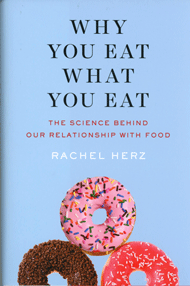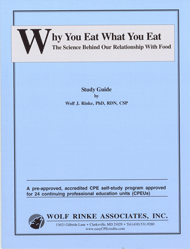|
Why You Eat What You Eat
The Science Behind Our Relationship With Food
| C317 |
24 CPEUs |
HARD COPY |
$194.95 |
|
This thought-provoking CPE activity presents clients’ relationship to food as a complicated recipe, whose ingredients--taste, personality, and emotion-- combine to make eating a potent and pleasurable experience. It weaves fascinating findings and evidence-based data into a narrative that tackles important questions, revealing how psychology, neurology, and physiology shape peoples’ relationship with food, and how food alters the relationship we have with ourselves and each other. More specifically you will discover how to:
- Recommend foods that can act as “pain relievers.”
- Advise parents how to help their children overcome neophobia and avoidant/restrictive food intake disorders (ARFID).
- Explain how food labeling impacts consumption, metabolism, and enjoyment of foods.
- Provide clients with strategies to best manage their weight.
- Teach clients how to enhance food flavors without adding calories, fat or salt.
Share with a friend and Save! Click here for important information about
sharing.
To order an ADDITIONAL Reporting Form click below:
C317F |
24 CPEUs |
REPORTING FORM |
$70.00 |
|
Why You Eat What You Eat
The Science Behind Our Relationship With Food
© 2024 Wolf Rinke Associates. All rights reserved for this self-directed accredited learning activity. Reproduction in whole or part without written permission, except for brief excerpts, is prohibited.
LEARNING OBJECTIVES
Upon completion of this accredited, self-directed learning program
you will be able to:
- Explain how sensory, psychological, neuroscientific, and physiological factors influence eating habits.
- Recognize how people experience the sense of taste and where taste receptors are located.
- Explain the four basic tastes and how they can be manipulated and enhanced.
- Recognize why bringing reusable bags to the grocery store may encourage people to buy more treats.
- Recommend foods that can act as “pain relievers.”
- Explain how the environment impacts how much clients eat.
- Help clients manage their appetite.
- Recommend how clients can best enhance flavors.
- Explain how the visibility and display of food can impact consumption.
- Recognize how shapes impact peoples’ perception of the quality of food.
- Advise parents how to help their children overcome neophobia and avoidant/restrictive food intake disorders (ARFID).
- Recommend how clients can decrease their intake of sweet, fatty and salty foods.
- Help clients combat the blues and other forms of depression.
- Help clients enhance the pleasure they receive from food.
- Apply findings from research to help clients manage their weight.
- Enable clients to enhance the sensations they can experience from eating.
- Recognize how the familiarity of foods influences eating habits.
- Explain how food labeling impacts consumption, metabolism, and enjoyment of foods.
- Debunk the claim that all calories are equal.
- Teach parents how to help their picky eaters explore new foods.
- Explain how foods can improve emotions such as anger, depression, stress etc.
- Provide clients with strategies to best manage their weight.
- Help clients better understand how shapes, colors, sound, weight, proximity etc., impact on how much food they eat.
- Help clients manage their cravings more effectively.
- Explain how comfort foods impact consumption and enjoyment.
- Teach clients how to enhance food flavors without adding calories, fat or salt.
- Recognize how food alters the relationship we have with ourselves and each other.
- Explain that what we eat is because of taste, personality, and emotions.
ABOUT THE AUTHOR OF THE BOOK
Rachel Herz is a neuroscientist specializing in perception and emotion. She teaches at Brown University and Boston College, and is a professional consultant. The author of The Scent of Desire and That’s Disgusting; she lives in Rhode Island.
ABOUT THE AUTHOR OF THE STUDY GUIDE
Wolf J. Rinke, PhD, RDN, CSP is the president and founder of Wolf Rinke Associates, a company that has provided high-quality CPE programs to nutrition professionals since 1990.
He earned a BS at Drexel University, an MS at Iowa State University, a PhD in Continuing and Vocational Education (Adult Ed) at the University of Wisconsin, and interned at Walter Reed Army Medical Center. He participated in a test item writer workshop sponsored by the Commission on Dietetic Registration (CDR).
Wolf is a past Adjunct Associate Professor, Graduate School of Management & Technology, University of Maryland, and a former Adjunct Faculty Member, School of Continuing Studies, The Johns Hopkins University.
He is the past president of the DC Dietetic Association and has been honored by the Academy with the Award for Excellence in the practice of Management; the Outstanding Dietitian of the Year Award; the Outstanding Service Award; and has delivered the Lenna Frances Cooper Lecture.
At the Academy he has served in numerous leadership roles including Chair, Scholarship Committee, DBC; Chair, Communication Committee, CDR; Chair, Area Coordinating Committee, COE; Chair, COE, and member of the Resource for Education Programs Committee; Honors Committee; CDR, Licensure Panel and Ethical Practices Task Force; CDR; House of Delegates and Board of Directors.
He is the author of more than 500 articles, numerous CPE self-study programs, and several popular books including Make It a Winning Life: Success Strategies for Life, Love and Business; Winning Management: 6 Fail-Safe Strategies for Building High-Performance Organizations; and Don’t Oil the Squeaky Wheel and 19 Other Contrarian Ways to Improve Your Leadership Effectiveness.
Return to the top of page
If you prefer to order by phone, mail
or fax click below
or click here to contact us with
other questions.
For information about our other products and
services return to the sidebar at the top of the page.
|
|
|



